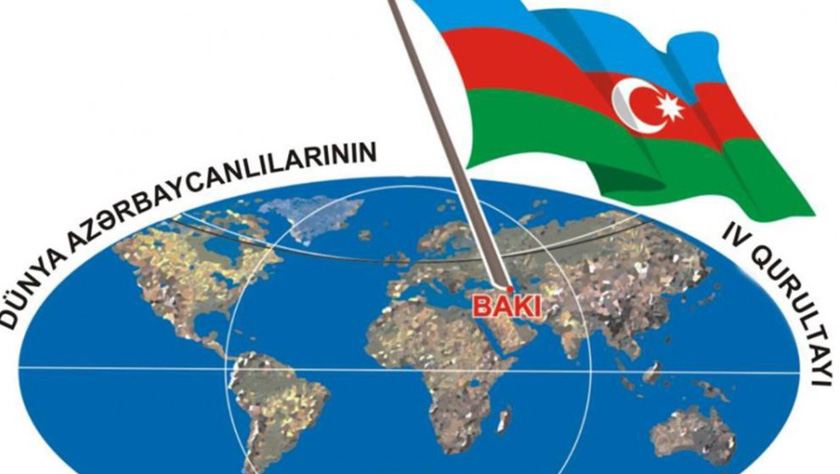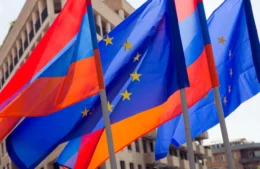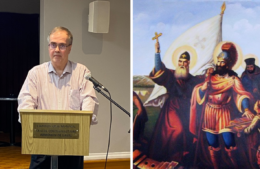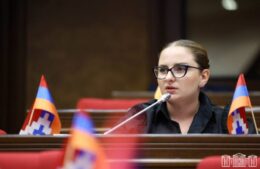Azerbaijan organizes its own Diaspora to compete with the Armenian Diaspora
- (0)

By Harout Sassounian
Publisher, The California Courrier
For many decades, the Turkish government has had an inflated image of the Armenian Diaspora, describing it as a giant worldwide force. In recent years, Azerbaijan has been infected with the same fear of the global Armenian Diaspora. Pres. Ilham Aliyev has described the ‘Armenian lobby’ as the greatest enemy of Azerbaijan. Consequently, the Azeri leaders have started pouring massive resources into the formation of their own diaspora in various countries as a counterpart to the “powerful Armenian lobby.”
Nazim Ibrahimov, Chairman of Azerbaijan’s State Committee for Work with the Diaspora, recently announced that “the establishment of coordination centers for world Azerbaijanis continues and that this affair is one of Azerbaijani President Ilham Aliyev’s priorities….
Last year, Sergey Rumantsev, a graduate of Baku State University, wrote an article in the OpenDemocracy.net website, titled: “Long Live the Azerbaijani Diaspora,” stating that “Baku is going to great lengths to mobilize, or even create, an international Azerbaijani diaspora.” The main purpose of the Azeri Diaspora is to counter Armenians in the Karabagh (Artsakh) conflict. Azeri leaders view the Armenian Diaspora “as immensely influential and strongly united in solidarity,” hence, “for Azerbaijan’s ruling Aliyev regime, a diaspora is synonymous with an overseas political lobby.”
Azeris have such an exaggerated view of the Armenian Diaspora that when the Russian Supreme Court decided to annul the registration of the All-Russian Azerbaijani Congress last year, “many [Azeri] commentators rushed to conclusions about Armenian plots and intrigues,” Rumantsev wrote. The truth is that the Azeri organization had violated Russian laws. Armenians had nothing to do with its closing.
Last year, Sergey Rumantsev, a graduate of Baku State University, wrote an article in the OpenDemocracy.net website, titled: “Long Live the Azerbaijani Diaspora,” stating that “Baku is going to great lengths to mobilize, or even create, an international Azerbaijani diaspora.” The main purpose of the Azeri Diaspora is to counter Armenians in the Karabagh (Artsakh) conflict. Azeri leaders view the Armenian Diaspora “as immensely influential and strongly united in solidarity,” hence, “for Azerbaijan’s ruling Aliyev regime, a diaspora is synonymous with an overseas political lobby.”
Azeris have such an exaggerated view of the Armenian Diaspora that when the Russian Supreme Court decided to annul the registration of the All-Russian Azerbaijani Congress last year, “many [Azeri] commentators rushed to conclusions about Armenian plots and intrigues,” Rumantsev wrote. The truth is that the Azeri organization had violated Russian laws. Armenians had nothing to do with its closing.
Prior to the Second World Congress of Azerbaijanis, held on March 16, 2016, “the state committee for working with Azerbaijanis abroad produced a documentary film with the telling title, ‘we’re a nation of 50 million,’” Rumantsev wrote. The committee stated that 10 million Azerbaijanis were living in about 70 countries.
Rumantsev asserted that Azeris living overseas are not a coherent group; there is a considerable difference among Azeri immigrants: “Azeri Diaspora activism is generally limited to quite a small circle of ethnic Azerbaijani businessmen and their family members.”
Rumantsev described the origins of the organizational efforts for Azeris abroad: “In November 2001, Baku held the inaugural World Congress of Azerbaijanis at the initiative of Heydar Aliyev. The following year saw the foundation of the state committee for working with Azerbaijanis abroad—Nazim Ibrahimov was appointed its permanent leader. Its first convention led to the creation of yet another body, the “Coordinating Council of World Azerbaijanis”, led by, of course, pan-Azerbaijani president Heydar Aliyev. The success of diaspora-building henceforth came to be measured in how many organizations existed, and how to unify them into one structure.”
The World Congress of Azerbaijanis consists of local/regional bodies, followed by Azeri organizations in various countries and finally by the World Congress which takes its orders directly from the Azeri government.
President Ilham Aliyev proudly told attendees of a recent conference of World Congress of Azerbaijanis: “if we had 336 diaspora organizations five years ago, now we have 416.” At the Fourth World Congress in 2015, “delegates stated that there are now 462 such organizations.”
The few activities Azeris participate in worldwide are represented by Azerbaijan’s official media in an exaggerated fashion, as if a large number of Azeris in Europe or the U.S. are involved in pro-Azerbaijan activities, in support of the Aliyev regime. For example, when Armenia’s President Serzh Sargsyan visited Berlin in 2016, a small number of Azeris held a protest, and sent the following message to Pres. Aliyev: “Mr. President—you have the support of Azerbaijanis across the world!”
Rumantsev concluded his article by stating that the Azerbaijani Diaspora cannot be compared to the classical Diasporas of Armenians, Jews or Greeks. Most Azeri organizations overseas “exist only on paper.”


















